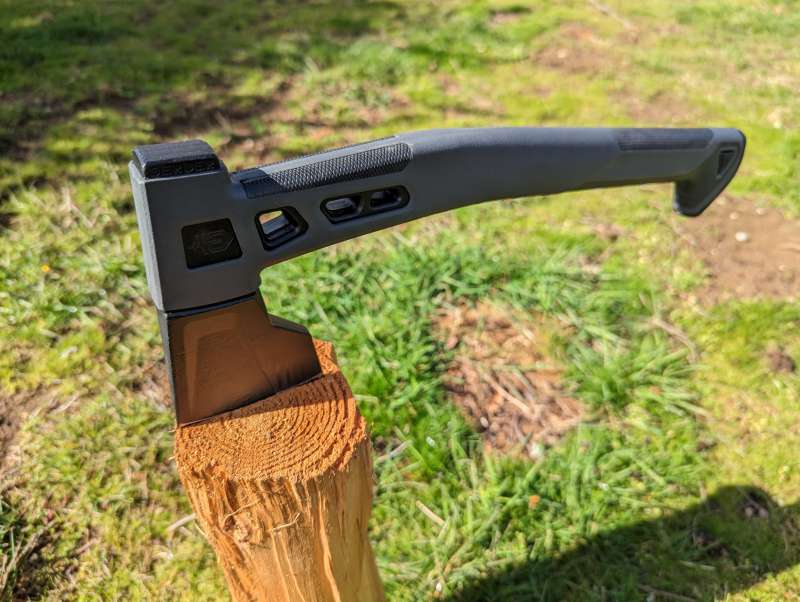
REVIEW – With spring fast approaching it’ll soon be time to break out the camping gear and head for the great outdoors. While I’ve gravitated towards “glamping” in recent years, I still enjoy roughing it on occasion. Since a good fire is essential to the experience I’m always on the lookout for tools that make firewood prep easier. The Gerber Bushcraft Hatchet caught my attention for its ergonomic design and dual functionality as a hammer. The hatchet is reasonably priced at $70 and comes from Gerber, a well-respected outdoor industry standard. However, the blade comes dull out of the box, and the gear storage compartment has some minor issues so it remains to be seen if the Gerber Bushcraft Hatchet will make it into my gear bag.
What is it?
The Gerber Bushcraft Hatchet is a cutting tool featuring a carbon steel forged single piece axe head and an ergonomic handle that includes a water-resistant gear storage compartment. The hatchet comes in Grey and Coyote Brown color options, both with a black axe head and black accents along the handle.
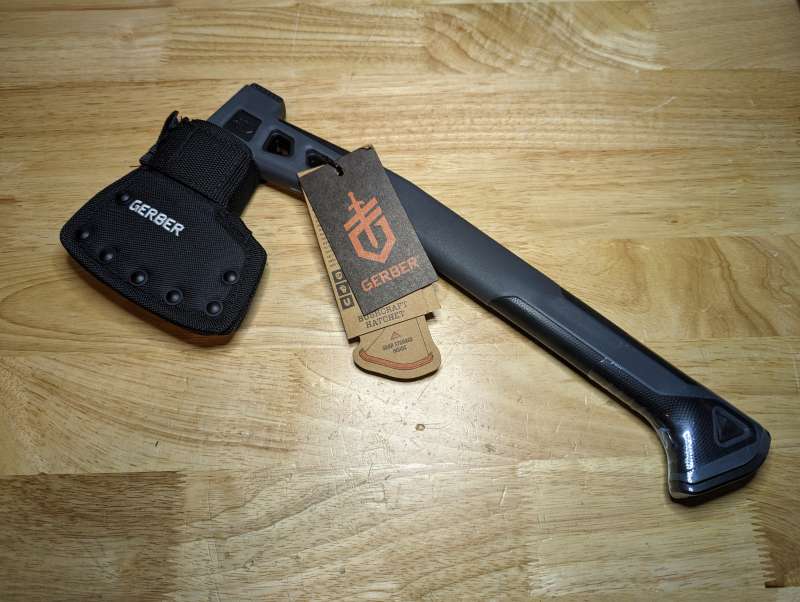
The Gerber Bushcraft Hatchet is minimally packaged, with only its nylon sheath, informational tags, and shrink wrap around the handle to protect the removable gear storage compartment. A small warning sticker is also included on one side of the handle.
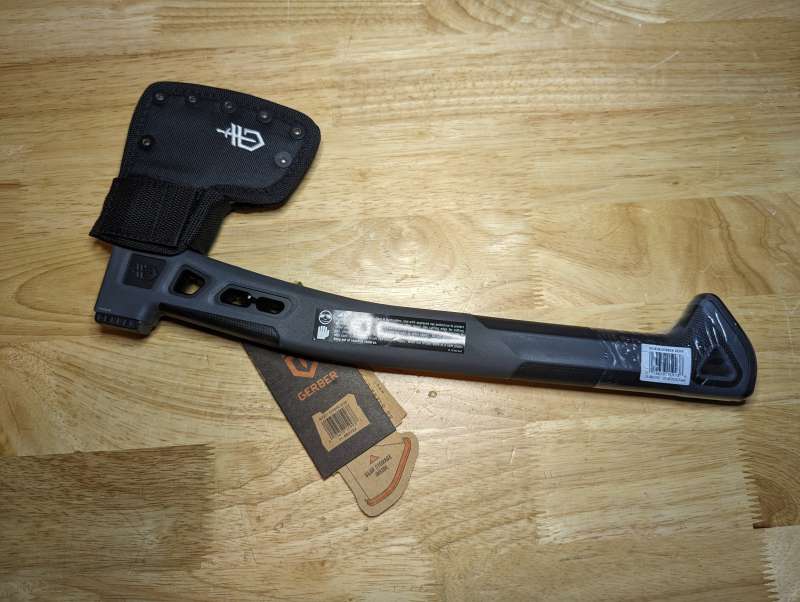
What’s in the box?
- Gerber Bushcraft Hatchet
- Waterproof Gear Storage Stick
- 5 feet of Paracord
- Dry tinder or mini lighter storage
- Nylon Sheath
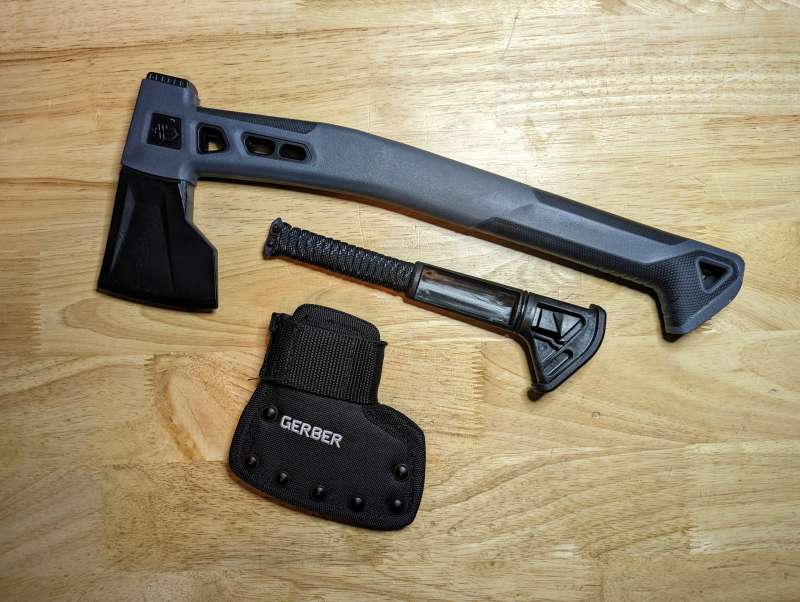
Hardware specs
- Overall Length: 15.25 in.
- Weight: 2 lbs. 6.4 oz.
- Blade Head Length: 5.5 in.
- Blade Head Thickness: .81 in.
- Blade Head Material: High Carbon Steel
- Blade Head Finish: Black
- Blade Cutting Edge: 3 in.
- Handle Material: Glass-reinforced nylon
- Available Colors:
- Grey/Black
- Coyote Brown/Black
- Sheath: Nylon with plastic insert
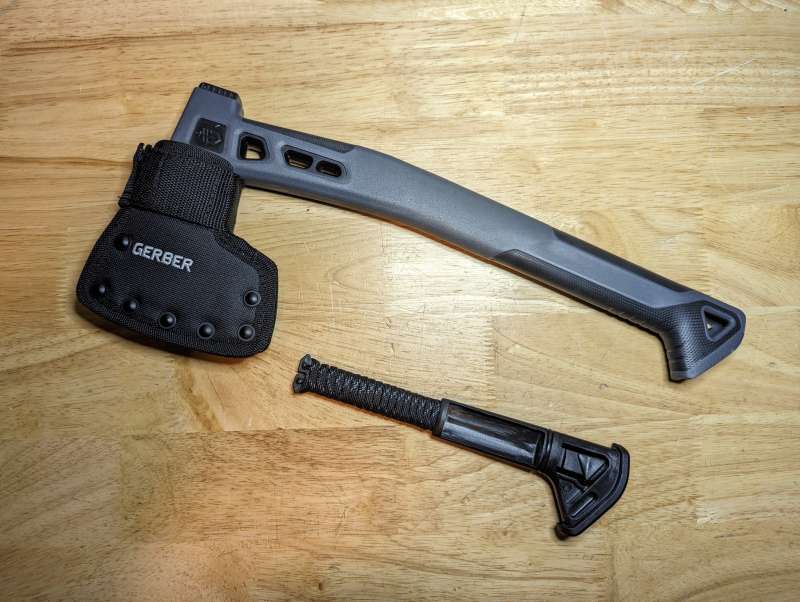
Design and features
The ergonomic design of the Gerber Bushcraft Hatchet is what first drew me to the unique looking tool. I like how the curved handle makes the hatchet feel in your hand and the superior grip it provides. The carbon steel axe head has a matte black finish and a sleek machined relief design to supposedly enable deeper cuts.
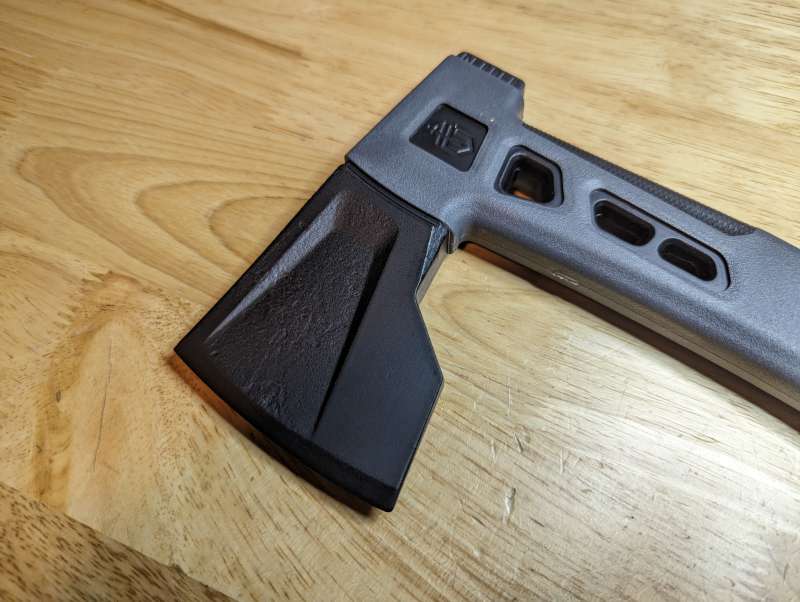
The blade of the Gerber Bushcraft Hatchet is my biggest issue with the tool. This blade ships dull, and I mean totally dull. There isn’t the slightest hint of an edge on this carbon steel axe head.
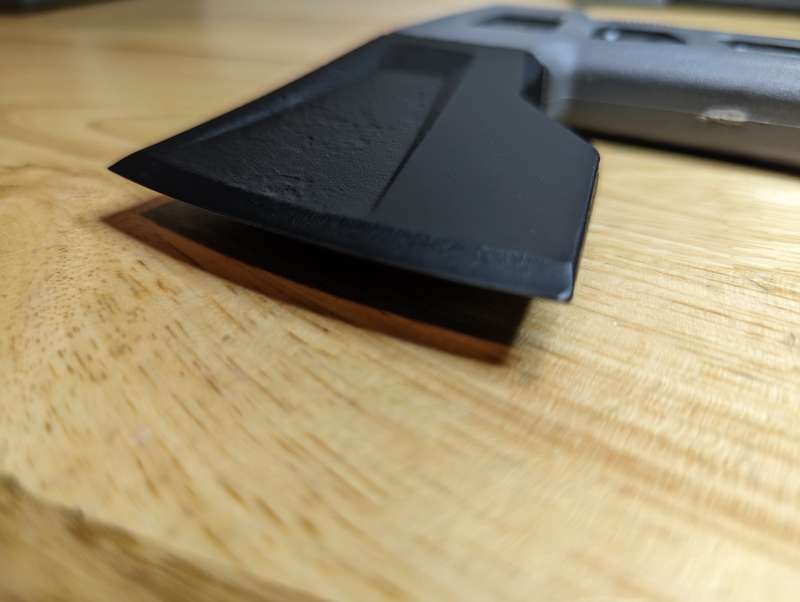
This is frustrating and means that you can’t use this hatchet out of the box without putting your own edge on it first.
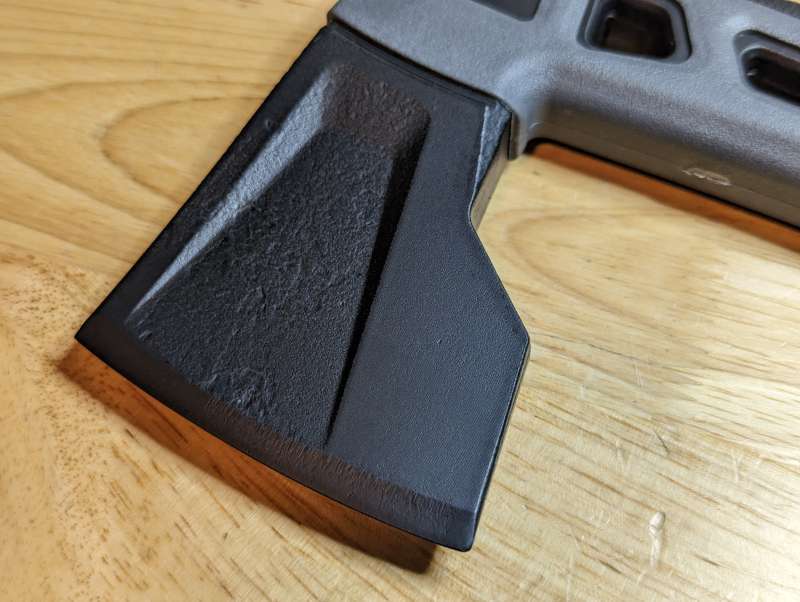
Luckily, the axe head is easy to sharpen and does hold an edge quite well, but for $70 I’d expect a hatchet with at least a workable edge.
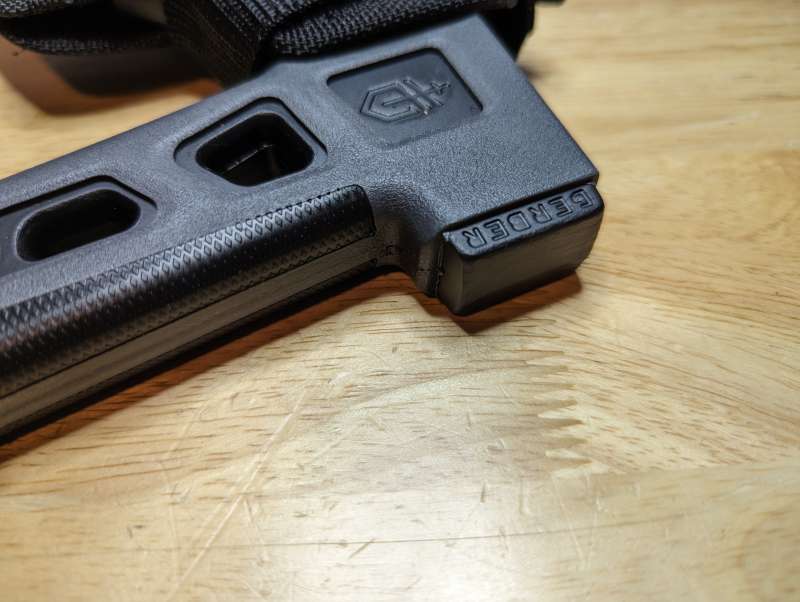
While the dull blade of the Gerber Bushcraft Hatchet is a major drawback, its dual-purpose axe head somewhat redeems the tool. In addition to the blade, the hatchet has a large flattened hammerhead side, which enhances its usefulness, especially for camping tasks.
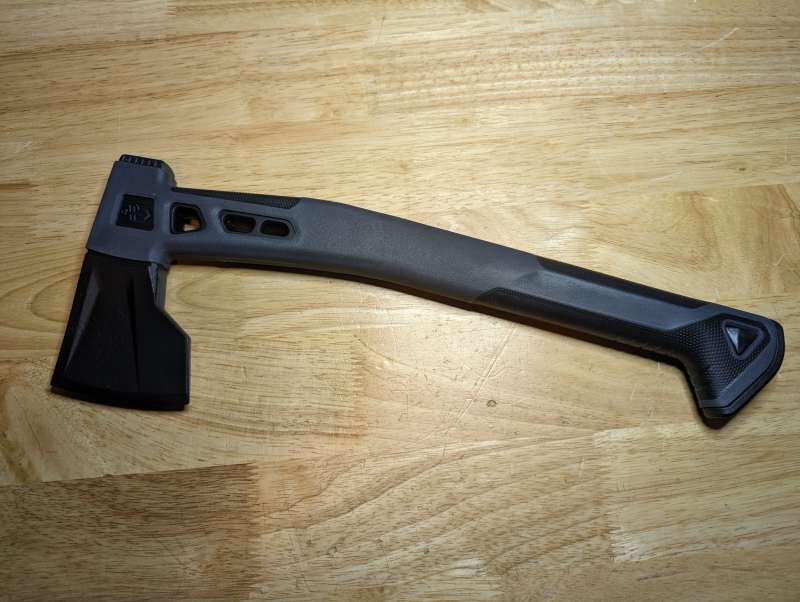
The ergonomic design of the handle works well making it comfortable to use for extended periods, whether as a hatchet or hammer.
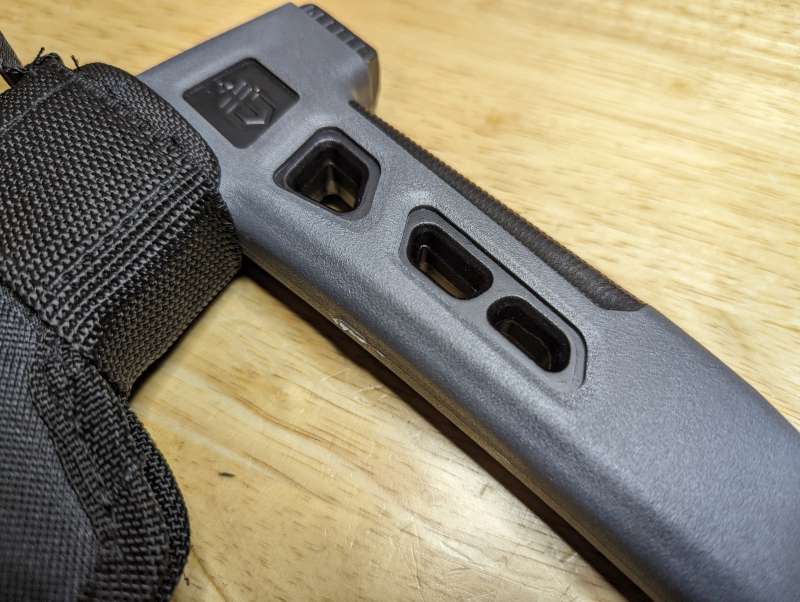
The handle has three large cutouts for weight reduction making the hatchet easier to manipulate.
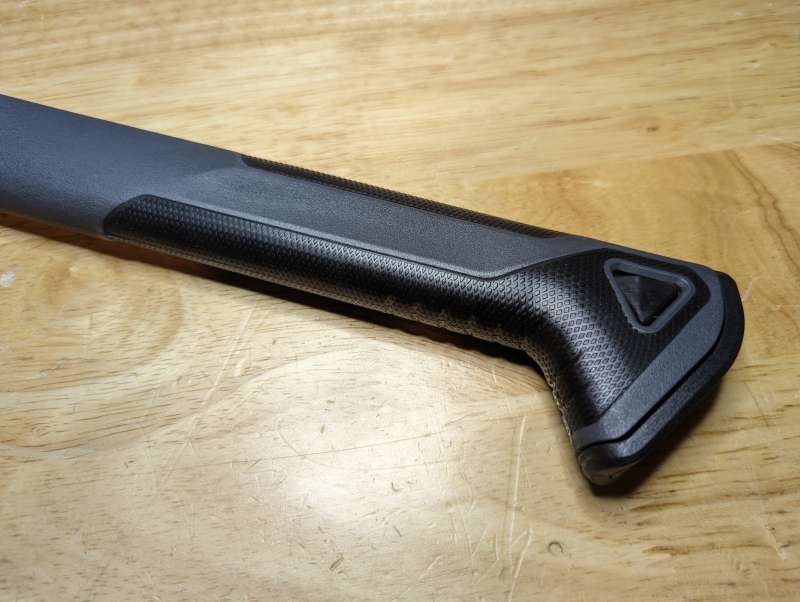
Additionally, the bottom of the handle flares out to prevent slippage and the stippled texture provides a better grip in wet conditions.
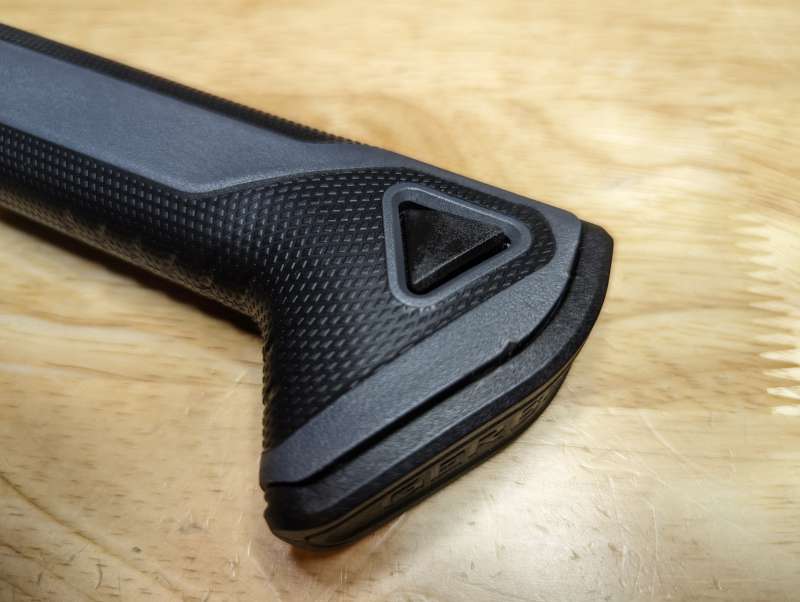
The most interesting feature of the Gerber Bushcraft Hatchet is found at the bottom of the handle.
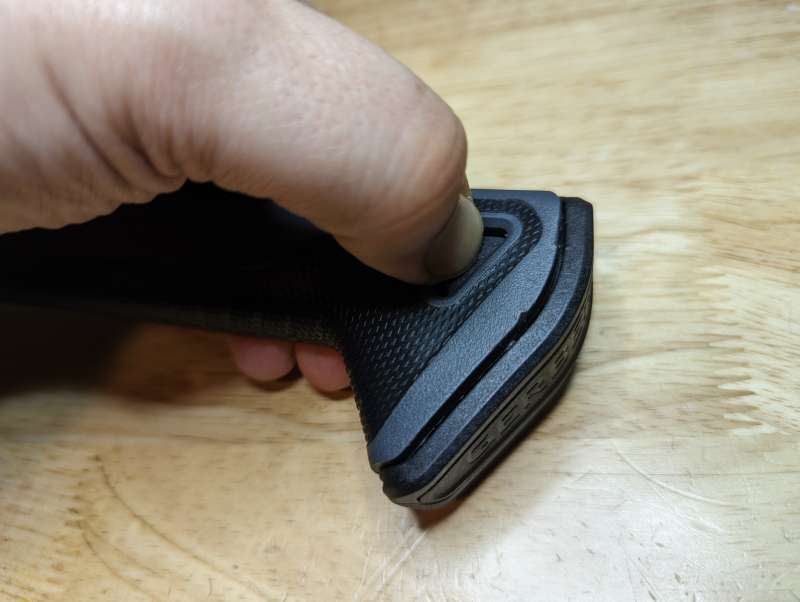
Pushing in on the small tab at the handle’s base releases a gear storage compartment.
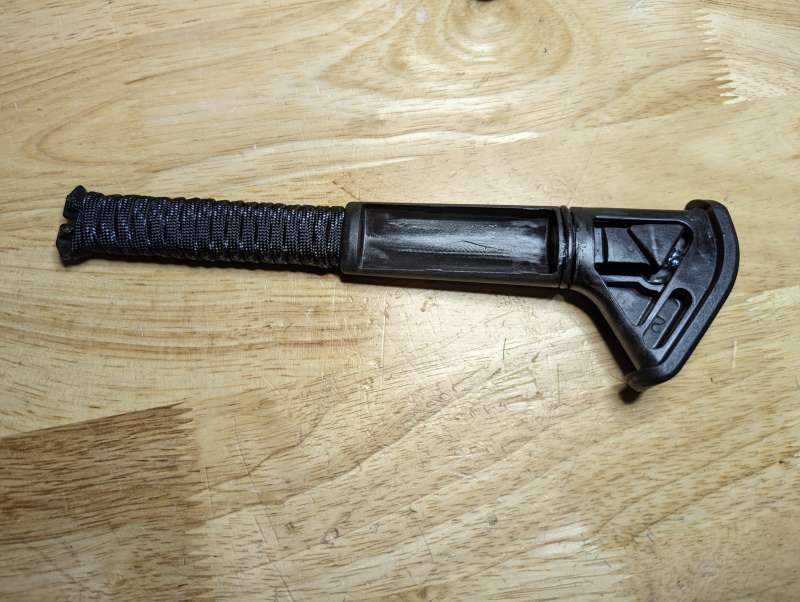
The gear storage compartment is a water-resistant plastic insert that fits into the bottom of the handle.
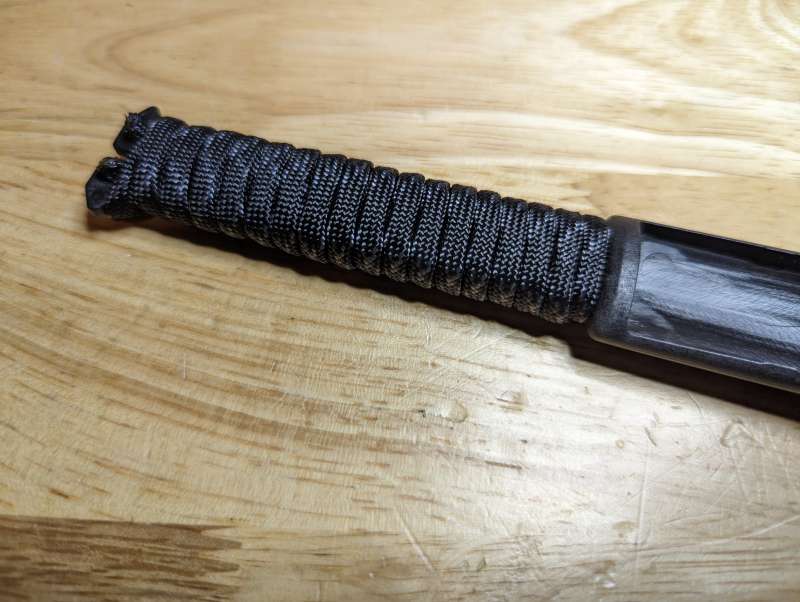
Five feet of paracord is wound tightly around one end of the compartment.
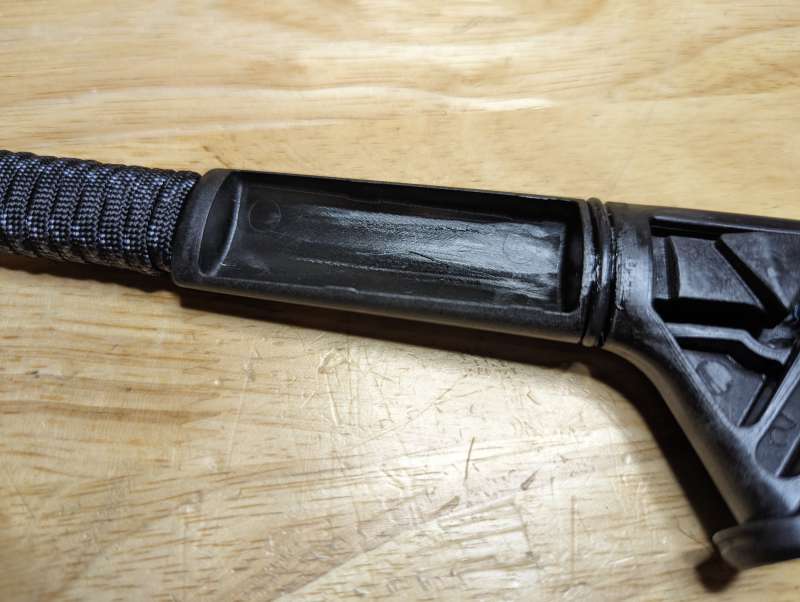
The open space in the compartment is sized to hold a mini lighter or any other fire-starting material.
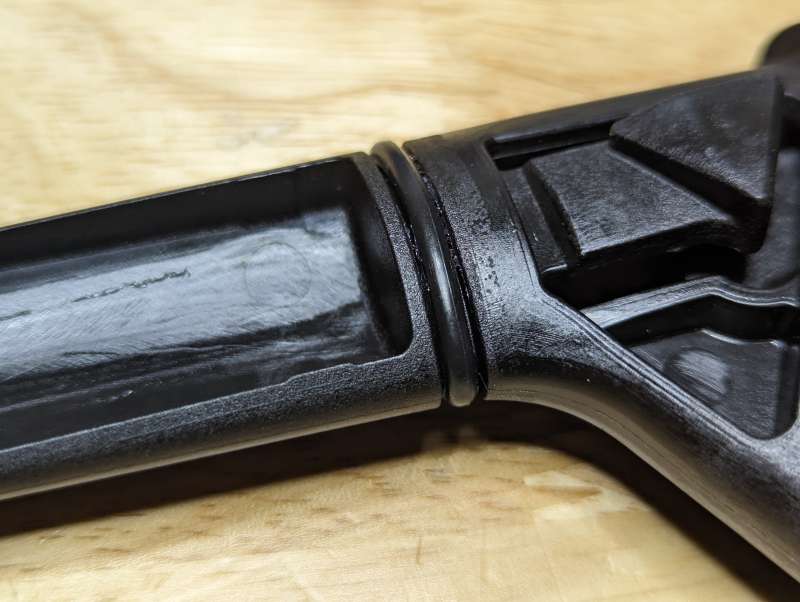
A small rubber washer helps to keep water out of the compartment.
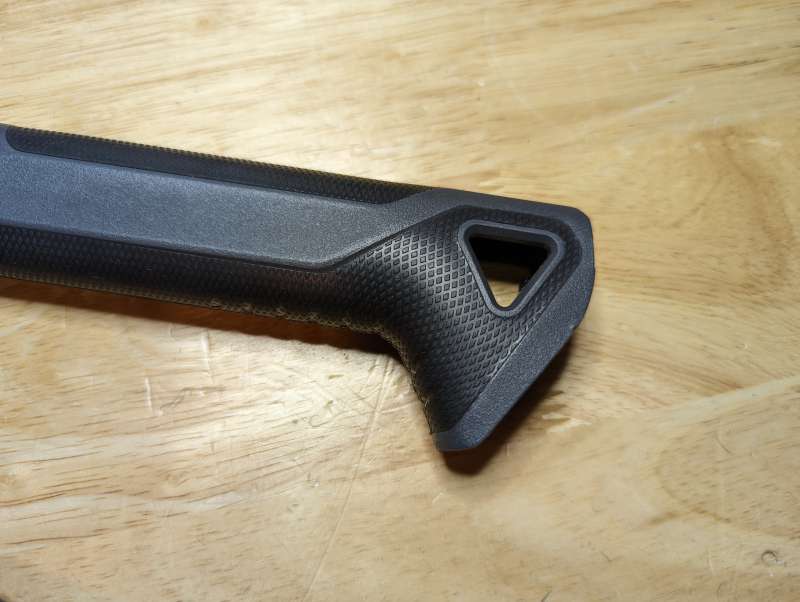
The hatchet can be used with or without the gear storage compartment and the hole for the release tab repurposed for attaching a lanyard.
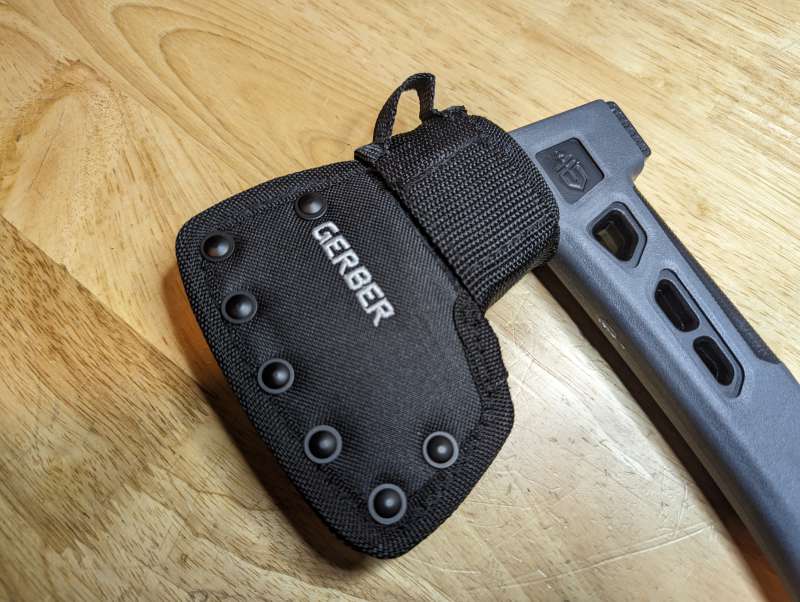
The included sheath for the hatchet fits snugly over the axe head and is secured with a Velcro strap with a small hanging loop on top.
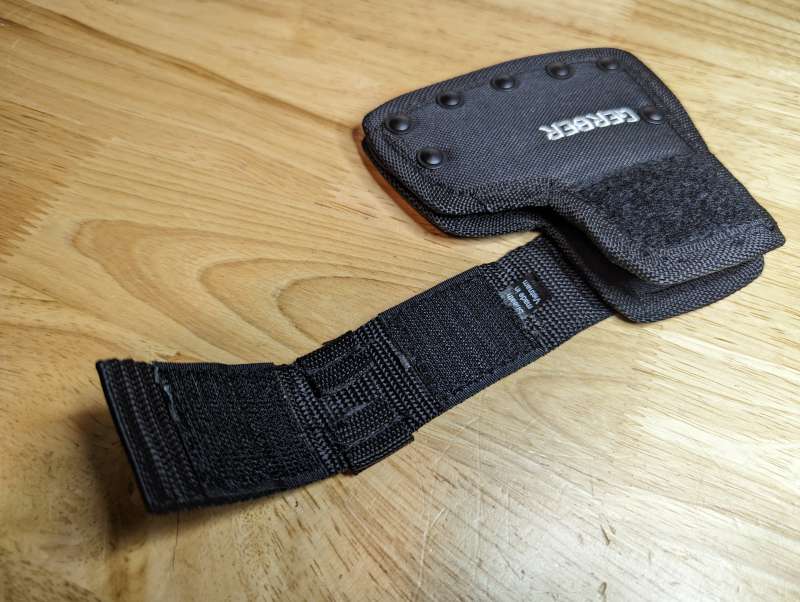
Made of durable nylon, the sheath has a tough plastic insert for blade protection.
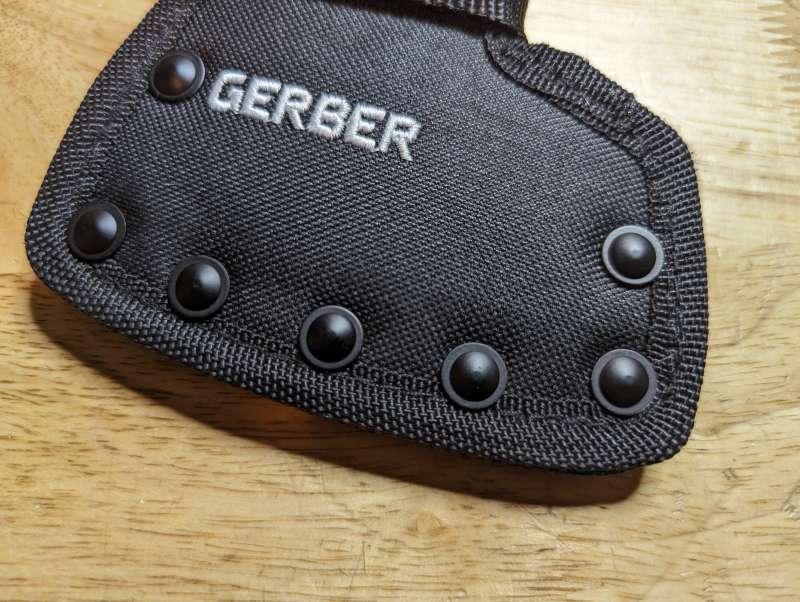
Seven hard plastic rivets and washers hold the insert in place.
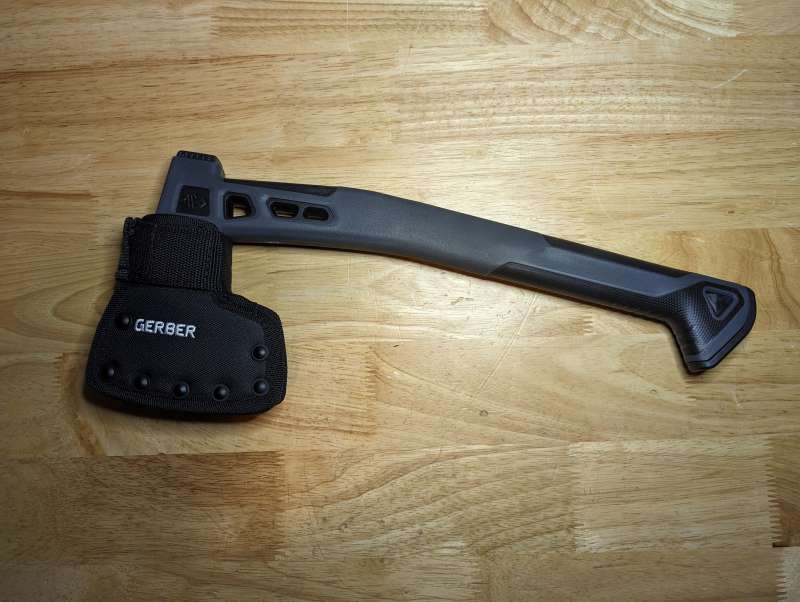
Setup
There shouldn’t be much setup for a hatchet, but mine required a little bit of TLC. First on the agenda was sharpening the dull blade.
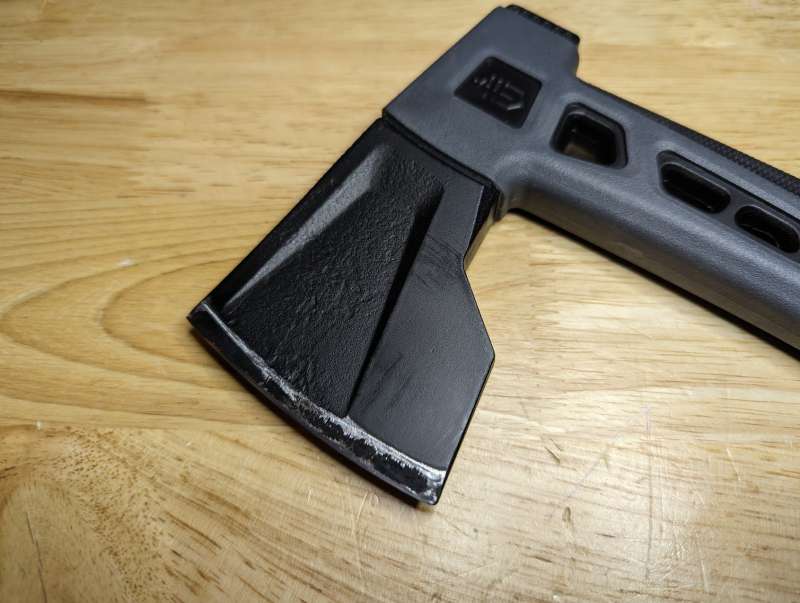
Now I never claimed to be a Bladesmith, but after a few passes with a sharpening stone I was able to get a serviceable edge on the hatchet, even if it did look a little rough. Next up was addressing an issue with the gear storage compartment.
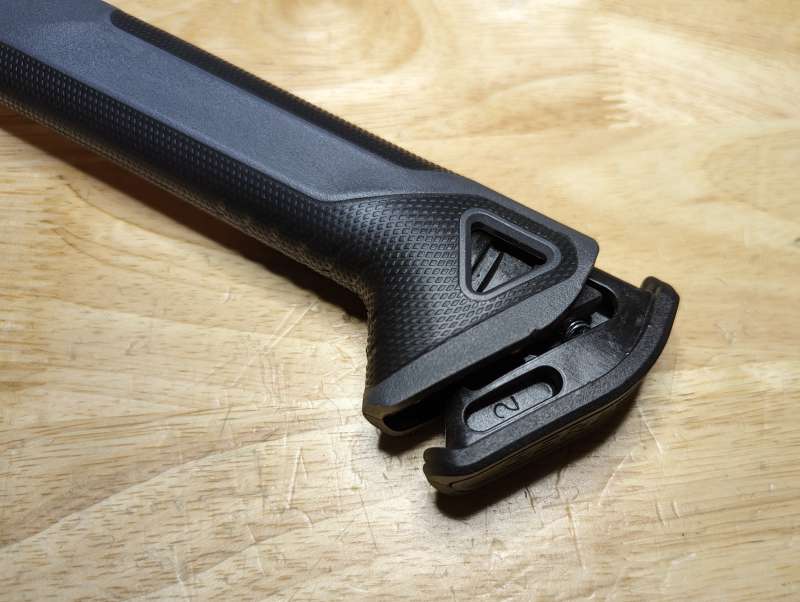
When I first tried to open the compartment it took a lot of effort to push the tab down far enough to remove the insert.
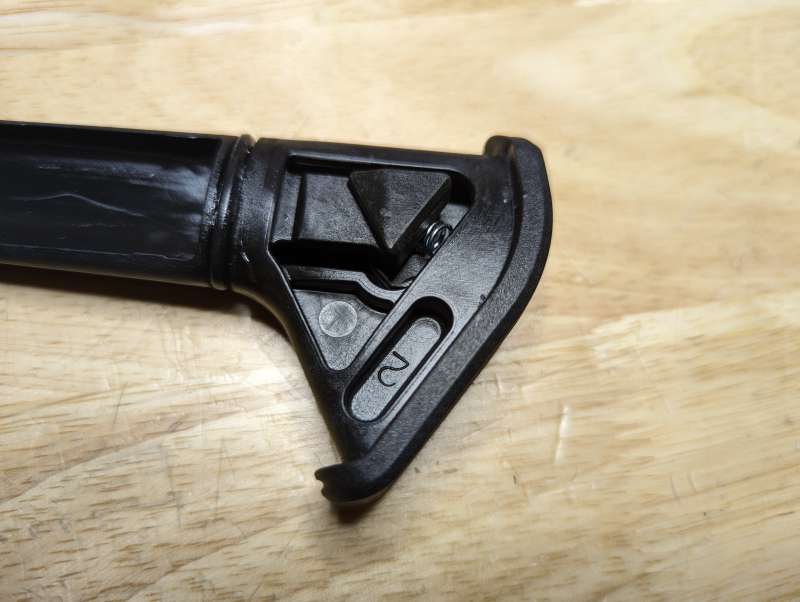
When I was finally able to remove the compartment I found the source of the problem. The tiny spring that keeps tension on the tab had shifted sideways somehow and was preventing the tab from pushing all the way in.
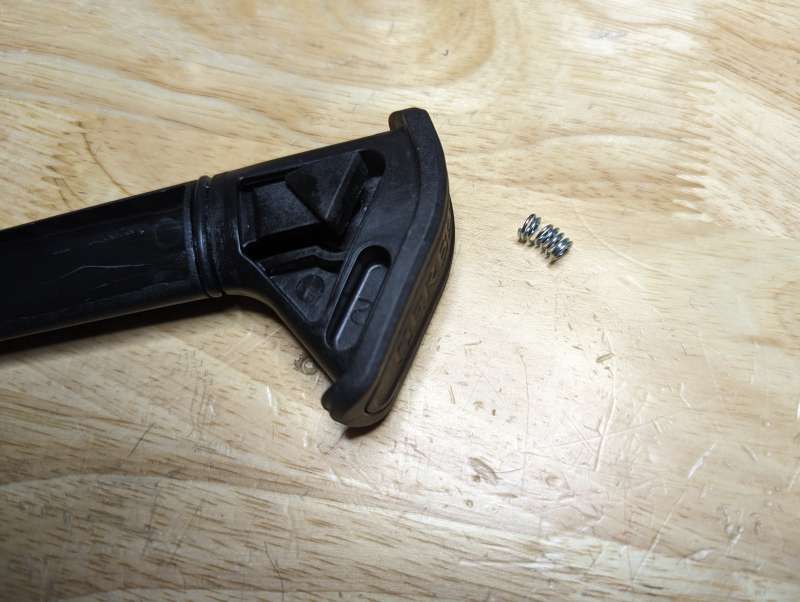
I removed the spring, reshaped it a bit, and then reinserted it underneath the tab.
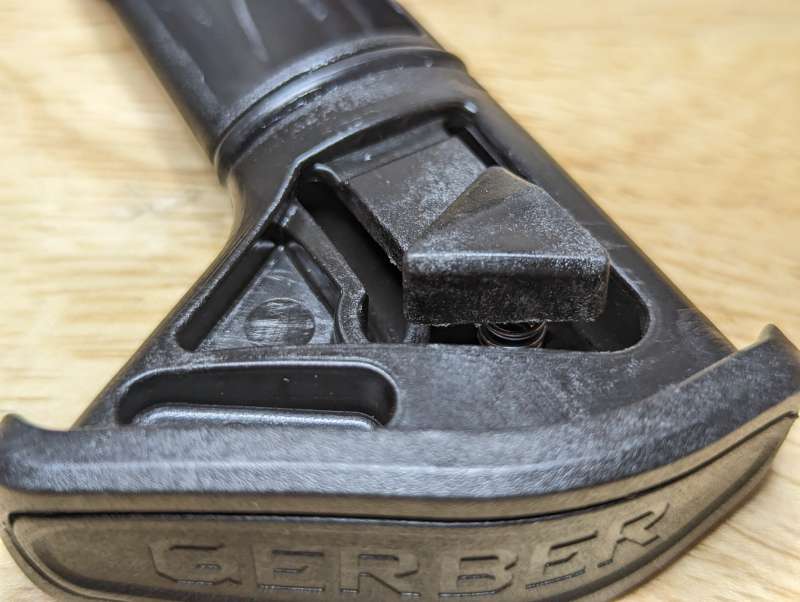
Once correctly in place, the tab functioned properly and removing the compartment was a lot easier.
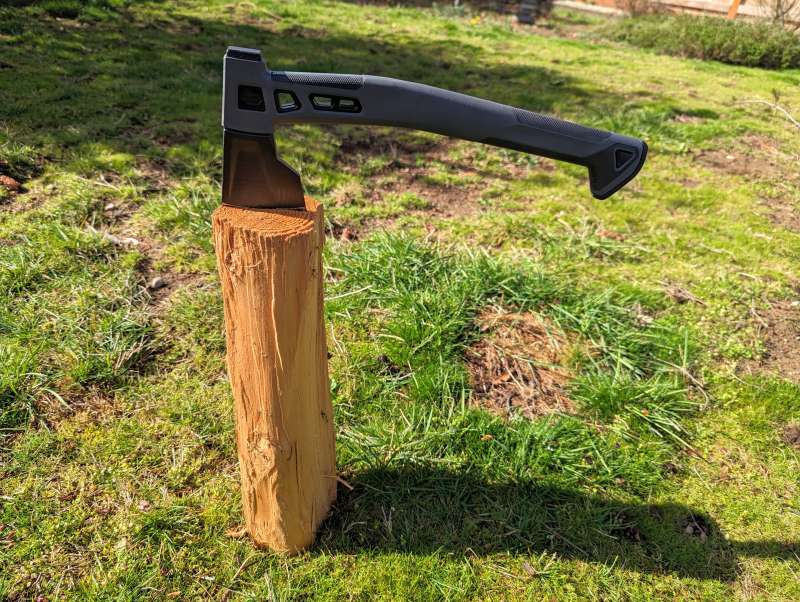
Performance
After sharpening the blade and fixing the gear compartment, it was time to start chopping.
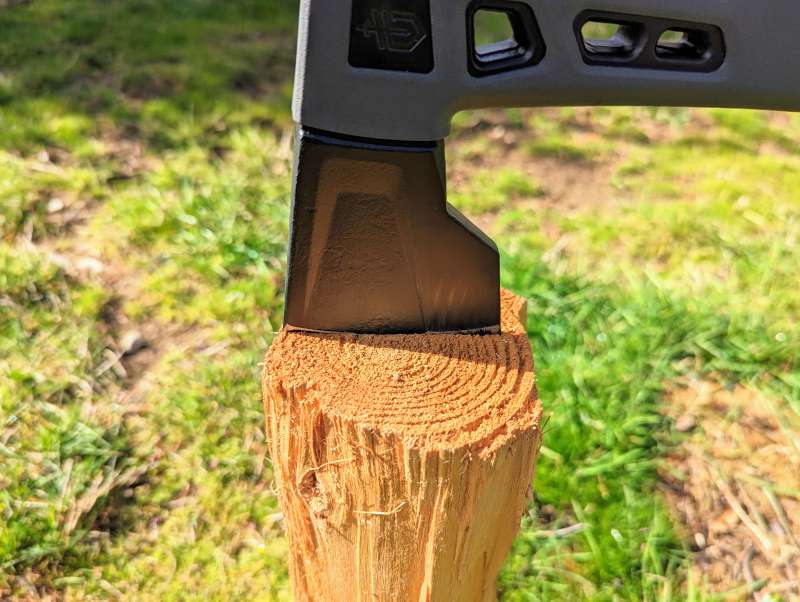
The newly sharpened edge made quick work of small to mid-sized logs, breaking them up into kindling with ease. The curved handle and weighted axe head helped drive the hatchet through whatever I threw at it without much difficulty. As advertised, the angles of the axe head definitely allowed for effortless deeper cuts.
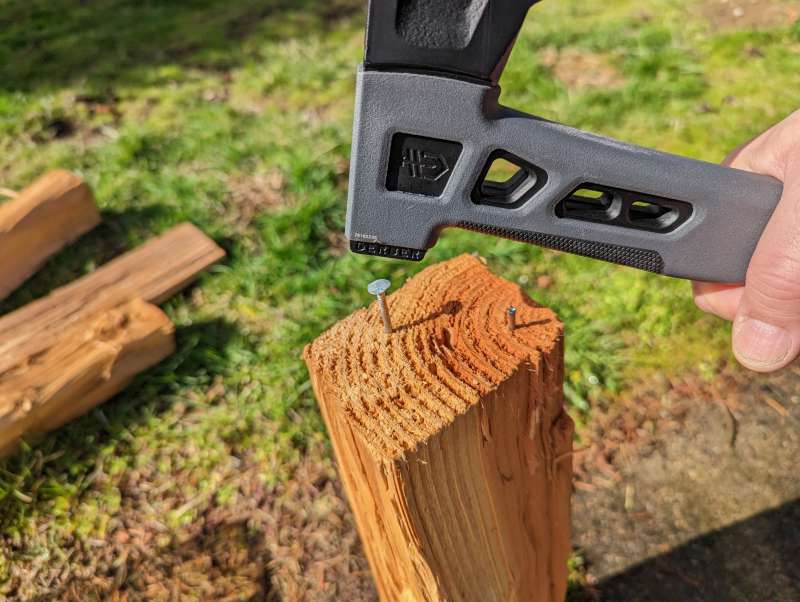
Flipping the hatchet around and choking up on the handle a bit I tried out the hammerhead as well.
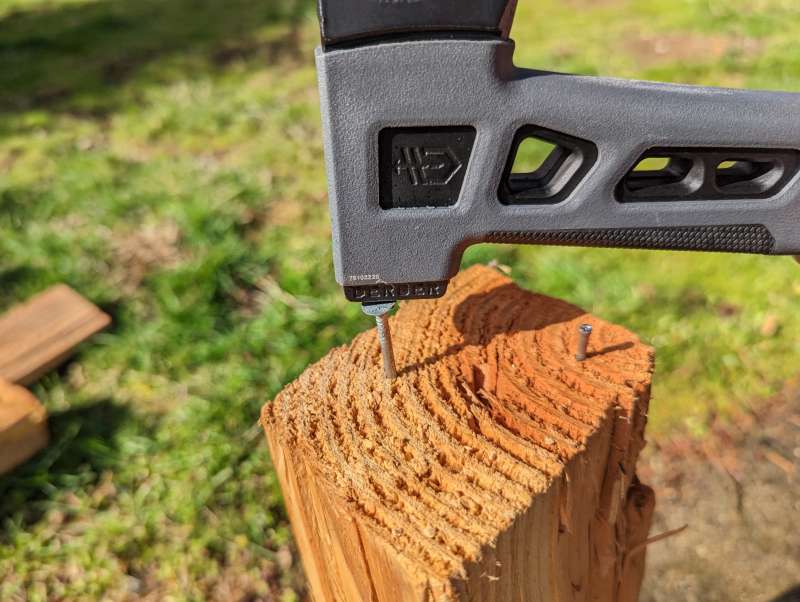
Driving in large and small nails was a breeze with the hammerhead. The design of the handle made the tool feel comfortable and light, but still provided enough force for striking.
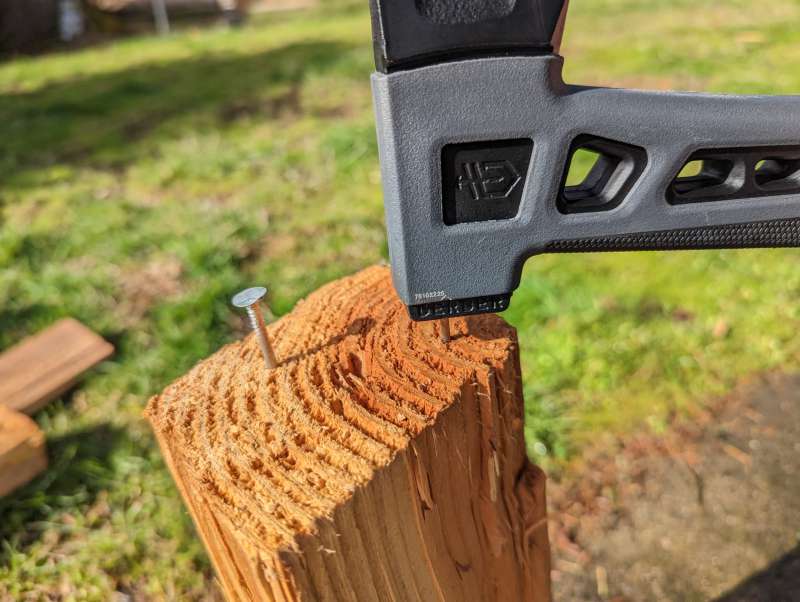
I could see the hammer functionality coming in handy on the campsite for tasks like driving tent stakes or building impromptu shelters. I did notice that the gear storage compartment rattled a lot during use. While it didn’t affect the tool’s performance, it was distracting. To address the issue, I plan to remove the storage compartment and attach a lanyard instead.
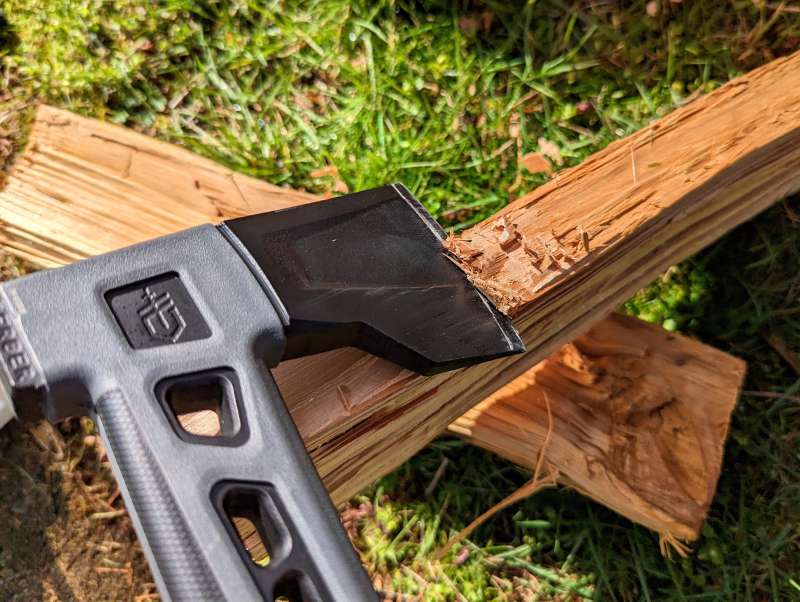
I tried feathering some wood with the freshly sharpened edge, but it wasn’t as effective as I had hoped. This was disappointing, but I think if I get a better edge on the blade I’ll be more successful.
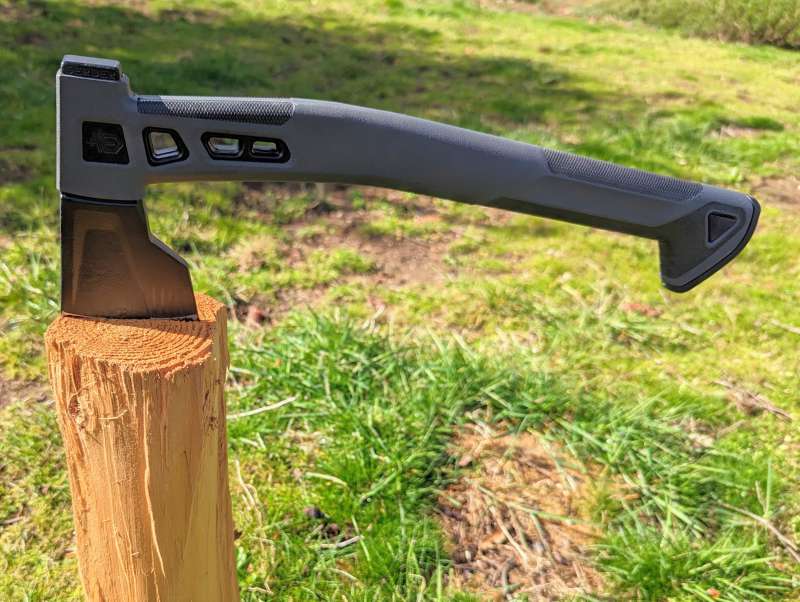
Overall, with a few modifications, the Gerber Bushcraft Hatchet should serve my camping needs. I plan to remove the storage compartment and have the blade professionally sharpened. Those fixes coupled with the excellently designed handle and grip should make this a tool I keep around for a long time.
What I like
- Comfortable ergonomic handle
- Useful as both a hatchet and hammer
- Easy to sharpen and maintain edge
What I’d change
- Arrives completely dull
- Gear Storage Compartment rattles during use
- No lanyard hole without removing Gear Storage Compartment
Final thoughts
The Gerber Bushcraft Hatchet is a versatile and ergonomic cutting tool that doubles as a hammer. Although it comes with a dull blade out of the box, it can be sharpened easily and holds an edge well. While the gear storage compartment is a unique feature, my unit required some minor repairs and the compartment tended to rattle during heavy use. Despite its minor flaws, the Gerber Bushcraft Hatchet is reasonably priced at $70 and offers good value for anyone looking for a reliable camping tool that functions well as both a hatchet and hammer.
Price: $55.89
Where to buy: Gerber and Amazon
Source: The sample of this product was provided by Gerber.



Gadgeteer Comment Policy - Please read before commenting
It’s junk. Plain and simple.
A hollow handle on a hatchet???
And almost as bad, a wrap around handle, with no hole in the ax head.
So what happens when people have a mis-swing and crack that plastic handle????
They certainly won’t be taking a stick and making a new handle….
Obviously the previous poster isnt familiar with the 1) long history of this style of construction Fiskars perfected a decade back – they have produced tens of thousands used world wide and owners – like me – have confidence in their construction as we have yet to break one.
2) the use of polymers for handles has advanced beyond wood now – and those sources of good quality wood handles are rapidly shrinking as fewer US companies rely on it. Polymer reinforced with fiberglass isn’t your uncles model car anymore – in fact, most knife scales, hammers, intake manifolds, valve covers, etc are polymer. They do just fine – look under your hoods.
It is, at least, a more confidence inspiring method of construction since there is a steel haft in that handle. I have pick axes, axes, and grub hoes with solid fiberglas handles which haven’t failed me in 30 years, I’m not going to worry about Fiskars/Gerber with their experience. If you can’t break it to begin with – very common with wood – then you don’t worry about replacing it, and that is a major upgrade from the older style of tools – they were, by their nature, the epitome of planned obsolescence because they had no choice.
Gerber has checked off most of the right boxes with this, including the price, and I will look forward to adding one to the truck. I could have used it today cleaning up a burn sight overgrown with weeds and fallen limbs.